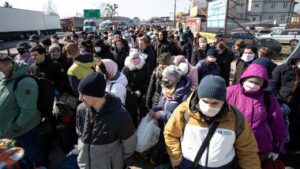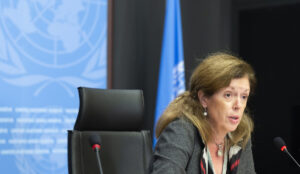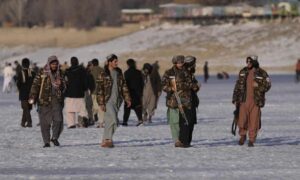
The National Interest Foundation Newsletter
Issue 137, March 10, 2022
Welcome to our NIF Newsletter. In this week’s headlines: the Russian invasion of Ukraine triggers the largest refugee crisis in Europe since World War II, the U.N. Special Adviser on Libya offers to mediate between rival political factions in an effort to push for delayed elections, and the Taliban detains a Canadian aid worker in Afghanistan under its widening crackdown on rights activists.
Ukrainian Refugee Crisis

Russian forces have been heavily criticized for attacking civilian areas and deepening the Ukrainian refugee crisis. (Photo from AP)
The Russian Invasion of Ukraine Triggers the Largest Refugee Crisis in Europe Since World War II
With the ongoing Russian invasion of Ukraine, the resulting refugee crisis continues to worsen as the number of people fleeing the country has now exceeded 2 million. Russian forces have been heavily criticized for the targeting and attacking of civilian areas, which has intensified the humanitarian disaster, with the United Nations High Commissioner for Refugees grimly estimating that the figure could grow to 4 million. While many have been able to escape the violence, others have remained trapped in Ukraine. The decimation of non-combatant infrastructure has led to a disturbing civilian death toll, hindered the efforts of those trying to leave, and deteriorated the existing living conditions. Attempts to establish humanitarian corridors have also had major shortcomings, as these supposedly safe pathways out of the country have been largely ineffective, with fighting still spilling over into them. All told, the mass exodus of refugees from Ukraine marks the largest such crisis in Europe since World War II, as besieged citizens evacuate at an alarming rate.
Attempts at Mediation in Libya

U.N. Special Adviser on Libya Stephanie Williams has urged for a joint committee to work towards establishing a framework for elections. (Photo from U.N.)
The U.N. Special Adviser on Libya Offers to Mediate Between Rival Political Factions in an Effort to Push for Delayed Elections
United Nations Special Adviser on Libya Stephanie Williams has outlined the importance of mediation between rival political factions in the attempts to push for delayed elections in the country. She has urged for a joint committee to work towards establishing a constitutional framework for this to take place amid concerns regarding a potential escalation of tensions after the Tobruk-based Libyan parliament recently swore in a new prime minister while the incumbent in Tripoli refused to cede power until new elections are held. Libya’s incumbent Prime Minister Dbeibah has maintained his intention to hand over power to an elected government, and has put forth a plan to hold a simultaneous parliamentary vote and referendum on constitutional amendments in June. Previously, elections in Libya had been scheduled for December of last year, however disagreements about the eligibility of several controversial candidates and the ground rules ultimately delayed the vote indefinitely. Now, there is a worry among international observers and analysts that the installment of a rival administration could heighten instability and spark an outbreak of violence.
Taliban Detainments in Afghanistan

Since the Taliban’s takeover in Afghanistan, there has been a rise in the targeting of journalists, aid workers, and other activists. (Photo from AP)
The Taliban Detains a Canadian Aid Worker in Afghanistan Under Its Widening Crackdown on Rights Activists
Afghan journalists, aid workers, professors, political analysts, and other activists have come under the increasing threat of arbitrary arrest in the months since the Taliban’s takeover in August of 2021. One of the most notable recent cases involves Nadima Noor, a dual Canadian-Afghan national and aid worker, who was detained by the Taliban last month. Noor ran a small humanitarian organization, and her family has gone public regarding the ordeal after repeated failed attempts to negotiate her release with Taliban officials. The rising prevalence of incidents like this mark a growing trend of arbitrary arrests in Afghanistan by the Taliban of both foreign nationals and Afghans alike. Further fueling the notion is the fact that these detainments are often not coupled with the formal charge of any crime, demonstrating the frivolous nature of the practice. As such, human rights defenders have justifiably expressed concern at the current state of freedom and liberties in Afghanistan.
